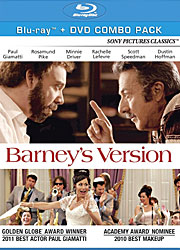- Rated R
- Drama
- 2011
- Buy the Blu-ray
All photos © Sony Pictures Classics
Reviewed by Bob Westal
()
ne thing that even relatively short novels often do that movies can have a hard time with is telling the story of a character's entire life. I'm no expert, but having seen the movie and read the first 60 pages of Mordecai Richler's 1997 final novel, "Barney's Version," I can tell you that Barney Panofsky (Paul Giamatti) is no David Copperfield and the movie about him is no "Citizen Kane" – or even "The Jolson Story" – but then, what is?
An ambitious young man with a penchant for hard liquor, the occasional doobie, and big cigars who flees the tightly knit Jewish community of Montreal for the dingy glamor of Parisian garrets, Barney finds himself a member of his own special lost generation. His choice of companions turns out to be a mixed bag at best. He forges a tight friendship with Boogie (a nicely relaxed Scott Speedman), a talented but utterly feckless writer with a taste for increasingly hard drugs who Barney will eventually be accused of murdering. He also falls for and marries the waifish and mentally ill faux shiksa, Clara (Rachelle Lefevre).
When that relationship ends in the absolute worst way possible, he returns to Quebec, largely abandons the bohemian trappings of his youth, starts producing a ridiculously lousy soap opera, and finds his way to a more stable woman with strong JCP (Jewish Canadian Princess) tendencies (Minnie Driver). Their marriage – so little thought through that neither Richler nor the filmmakers have given Mrs. Panofsky #2 a name of her own – is not long for this world. As if the troubles between his new in-laws and his oddly lovable, ex-crooked policeman father (Dustin Hoffman) aren't bad enough, he realizes he's head-over-heels in love on his wedding day, and not with the bride. Worse, he's absolutely right to love Miriam Grant (Rosamund Pike). She is, therefore, far too upright to even consider having anything beyond a lively conversation with him. At first.
Believe it or not, that last paragraph is spoiler free. Both the book and the movie of "Barney's Version" jump around in time with abandon, though few will have a hard time following the events in the film. The novel is, as you should expect, a very different beast. It takes the form of a free-associating memoir by the aging Barney, who is trying to respond to the still lingering charges that he murdered his best friend and is generally a bad person even as his own health is starting to deteriorate. It's very deliberately as discursive as all get-out and not the kind of book that frequently gets made into movies these days.
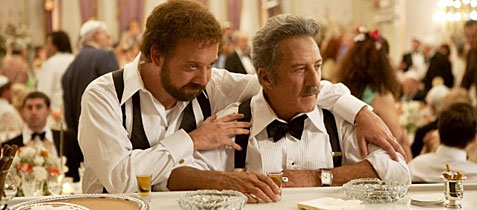
For its first half, "Barney's Version," is an imperfect but highly charged and intelligent entertainment, as we cut from the aging Barney trying to reconnect with his estranged family to his often absurd younger life. You can quibble about pairing the very ordinary looking Giamatti with his beautiful wives in the film – and in some ways it's even harder to take if you know of Barney's many alleged youthful sexual conquests mentioned in the book – but Giamatti is by far one of the very best actors of his generation and is believable enough and fun enough to make us forget all that. Crucially, Giamatti's commitment ensures that we are convinced that Dustin Hoffman really is the embarrassing father to whom he is absolutely devoted, and that Rosamund Pike is his true love and his guiding star, and even that she will eventually return his love.
On their own, both Pike and Hoffman are stellar. We've come to expect excellence from Pike, but it's nice to see an actor like Hoffman, who can be erratic and showy in his post-superstardom, really sliding into this kind of role as if he was just another underrated, top-tier character actor. Just as good in a one-scene cameo is actual underrated, top-tier character actor Saul Rubinek, playing a previously unknown in-law who brings some surprising and unwelcome news. It's one of the few scenes that really allows us to see the uglier and untamed side of Barney.
As the love story between Barney and Miriam becomes the story of a marriage and then a divorce, the movie around them loses its nerve. It may or may not be relevant, but director Richard J. Lewis ("C.S.I.") and writer Michael Konyes have worked mostly in television. In any case, they both show a failure of imagination when met with this material.
Though I understand the goal was to make Montreal a character in the film, director Lewis fails even to bring us any memorable visuals of North America's most beautiful city. (Seriously, they've got food courts in Montreal that are works of art.) Much worse, he does not figure out how to deal with the more serious and sad events of the second half without losing his film's sense of humor. Lewis's version of "Barney's Version" simply cannot be anywhere near as politically incorrect as its protagonist, and that is a problem. Also, (pet peeve time) Lewis resorts to syrupy music to underline the drama when he should simply trust in the enormous abilities of his cast. To Lewis's credit, though, those performances never suffer. It's just not enough to save the later portions of his film from being, for the most part, a complete drag.
Like I said, I've only gotten about 1/6th of the way through the book, so I can't hold myself up as some sort of expert on Mordecai Richler's vision. I have read enough, however, to tell you that while it's somewhat played down in the movie, Richler's Barney Panofsky is, while not quite a writer, a hyper-literate, highly assiduous thinker. I might be wrong, but I think he would have disliked the second half of "Barney's Version" even more than I did.
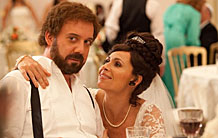 |
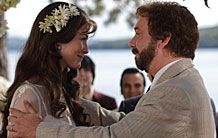 |
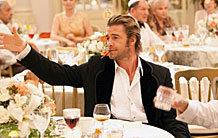 |
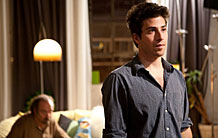 |
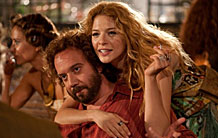 |
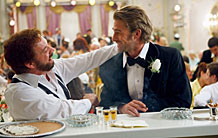 |
You can follow us on Twitter and Facebook for content updates. Also, sign up for our email list for weekly updates and check us out on Google+ as well.












